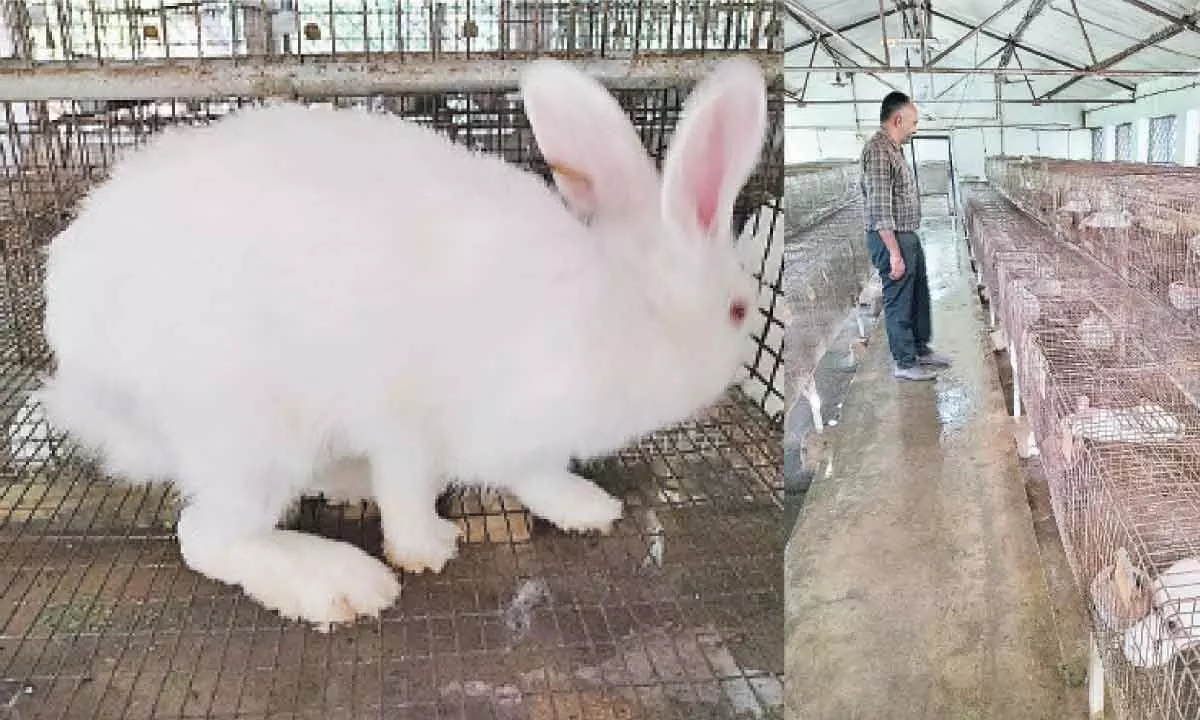Rajendranagar: Rabbit production yields promising result at Veterinary institute

Two new genetic groups produced at Dept. of Animal Genetics and breeding is attracting commercial enterprises
Rajendranagar : Constant research activities at Department of Animal Genetics and Breeding, College of Veterinary Science Rajendranagar to rear various breeds of rabbits under controlled environment and focused supervision is now paying it back. As a result of these concerted efforts, this facility is coming to help people having the desire to form a business of bunnies in the city and surrounding areas that are approaching to buy different varieties of cones available under one roof.
In a serene atmosphere just a few minutes away from Dairy Farm Cross Roads under Rajendranagar, a rabbit farm consisting of two colossal shades was established over three decades ago where different breeds of Rabbits were nurtured under controlled environment and supervision of veterinary experts.
"As a result of cross breeding utilising three rabbit breeds, two new genetic groups namely APAU (Andhra Pradesh Agriculture University) black and fawn named after their skin coat were developed and produced at the facility during the early 90's. Though these varieties are dwindling in numbers, efforts are being made to restore the variety and are hopeful that they would be restored in days to come and thereby to amplify meat production through promoting commercial enterprises in future," explained Sarin Karthikeyan Kunnath, Assistant Professor Department of Animal Genetics and Breeding, College of Veterinary Science, Rajendra Nagar.
Rabbit meat contains about 20-22% proteins, is low in cholesterol and is relished by all age groups of all communities. The small and marginal farmers can start farming with 5-10 pairs of rabbits while marketing and management will increase the stock gradually there to help meet subsidiary demand for the meat in the market.
Presently, he said, we have nearly two hundred rabbits of five different breeds such as Grey Giant, Flemish Giant, Californian White, New Zealand White and Soviet Chinchilla with two new genetic groups called APAU black and fawn produced at the facility itself.
We feed them twice a day keeping them under a fully ventilated but arguably covered and protected environment. Concentrate feed offered to rabbits consists of ingredients such as maize, wheat bran, ground nut cake procured freshly and grounded before being fed. Apart from this 3% mineral mixture is added to concentrate feed.
“As a commercial enterprise, rabbit farming arguable needs a very less investment to start business comparatively to dairy, sheep, goat and poultry,” he said adding that “Rabbits are less susceptible to bacterial, viral infections and zoonotic diseases and more importantly have lower death rates when compared to other species.” Apart from this, he said, the required medical aid is minimal with no vaccination being mandated for rabbits compared to poultry that required year round schedules. “Breeds like Soviet Chinchilla, Flemish Giant and Californian White are presently available at our facility for commercial enterprises,” maintained Sarin Karthikeyan.














